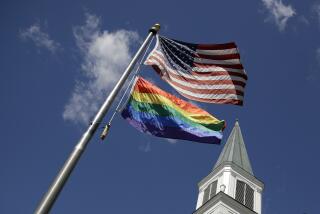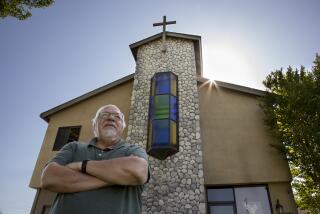Gay Episcopal Group Targets 5 Delegates : Ministry: It says representatives to National Council of Churches oppose ‘observer’ status for a largely homosexual denomination.
- Share via
NEW YORK — A gay and lesbian caucus of the Episcopal Church wants five Episcopal delegates to the National Council of Churches replaced, charging that their opposition to “observer” status for a Los Angeles-based, largely homosexual denomination violates Episcopal Church policies.
The caucus, called Integrity, is mounting a campaign to replace the five appointed delegates with Episcopalians who are active in homosexual ministries in the Episcopal Church.
Kim Byham, director of communications for Integrity, said this week that he is mailing 500 letters to clergy members of Integrity in hopes of building support for the Metropolitan Community Churches.
“I have never been so ashamed of being an Episcopalian as I was last month at the meeting of the National Council of Churches,” Byham’s letter says.
Specifically, in a resolution sent to Presiding Bishop Edmond Browning, Integrity criticized actions of the five delegates to the council’s General Board, saying they had caused “hurt and confusion.”
The critics referred to the way the five voted at the board’s annual meeting, held Nov. 11-13 in Cleveland, where they joined the majority and voted against the Metropolitan Community Churches’ request to become a council “observer.”
As observers, representatives of the Metropolitan Community Churches would be able to attend meetings of the council, the nation’s predominant ecumenical body, and its committees. Observers have no vote in council business.
Integrity’s resolution urges the council’s General Board to reconsider the measure at its next annual meeting, scheduled for next fall.
According to Integrity, the vote against its request contradicts resolutions of the church’s General Convention, its highest policy-making body. The convention has called for dialogue among homosexuals and heterosexuals on matters of sexuality.
Technically, those resolutions have been directed at dialogue within the Episcopal Church. Nevertheless, Integrity charged in its resolution that the delegates’ vote against the Metropolitan Community Churches “has set forth an ecumenical policy which is at odds with the teachings of this church.”
But the Rev. Eileen Lindner, a National Council staff member, said Integrity’s position is faulty.
The council vote includes a recommendation for continuing dialogue through the council’s membership committee, she said.
The primary target of Integrity’s anger is the Rev. William Norgren, the top ecumenical official of the 2.4-million-member denomination.
“We dissociate ourselves from the action of the ecumenical officer of the Episcopal Church and the majority of the members of the Episcopal delegation,” Integrity said.
Integrity also criticized Norgren for what it termed his failure to make sure that substitutes filled in for delegation members who were unable to attend the General Board meeting. The church has 14 delegates, but only eight Episcopalians voted on the controversial application.
Norgren, reached this week at Episcopal Church headquarters in New York, declined to comment on Integrity’s charges, saying he was expecting a statement from Browning’s office on the matter.
Byham said he had learned that Norgren decided to join those favoring no action on the application after it became clear that Orthodox Christian denominations might leave the National Council if the application was approved.
Ironically, perceptions that the Episcopal Church condones homosexuality have been at the center of discontent among the council’s nine Orthodox member denominations. Last year, five of the nine temporarily suspended their memberships in the council.
At the General Board meeting in November, the Orthodox were considering whether to resume formal dialogue talks with the Episcopal Church, which had also been suspended last year. The Orthodox had indicated that they would pay close attention to the way the Episcopal delegation voted on the Metropolitan Community Churches application.
Three of the National Council’s 32 member denominations formally dissented from the General Board’s action--the United Church of Christ, United Methodist Church and Swedenborgian Church.
More to Read
Sign up for Essential California
The most important California stories and recommendations in your inbox every morning.
You may occasionally receive promotional content from the Los Angeles Times.













